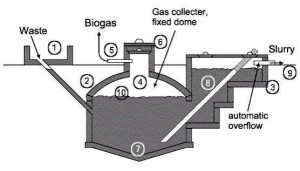DOMESTIC BIOGAS:
Biogas digesters are a simple to operate, environmentally friendly alternative energy source with little carbon footprint. The use of biogas digesters in many developing countries is extensive, however within Southern Africa this elementary technology has not been incorporated into the mainstream domestic life within the rural areas. In India 5 million families get their daily energy needs from bio-digesters, in China 25 million digesters provide environmentally friendly energy.
The biogas digester is used to capture methane from agricultural and animal waste. The biogas digester traps methane, a strong greenhouse gas, and stores it for domestic use such as cooking and heating. This in turn will greatly reduce the need for the unsustainable use of fuel wood for cooking and heating and will prevent the uncontrolled emission of methane into the environment.
HOW IT WORKS:
- Bio degradable kitchen and animal waste is fed into the biogas digester and bacterium and chemical reactions decompose the waste into biogas, solid residue and nitrate-rich liquids. This process takes 30 to 35 days to maximise methane production and capture. From then onward a constant feed of animal waste will result in a constant production of methane gas to be used for cooking and heating.
- Methane gas is collected in the bio-digester ready to be used on demand for heating or cooking and with a small modification can be used to run a diesel generator for the production of electricity.
- The residual waste from the biogas digester is used as highly effective organic compost.
- Biogas digesters are expected to reduce net greenhouse gas emissions over traditional animal waste management processes by approximately 95 percent.
- The use of a biogas digester will result in a cleaner surrounding water system and in the reduction of malaria by restricting the hibernation locations of mosquitoes.
ADVANTAGES OF BIOGAS DIGESTERS:
Deforestation: The average rural family consumes 3 tons of wood fuel per annum for cooking and heating. A biogas digester will eliminate the need to use wood fuel.
Global Warming: Biogas technology helps to lessen global environmental pollution from greenhouse gas emissions by trapping and burning Methane, a dangerous greenhouse gas, as an energy source stopping its release into the atmosphere.
Biogas as an electrical energy supply: The gas can be used to generate electricity. One of the existing technologies for this conversion is a diesel (compression ignition) engine with minor modifications allowing a rural school to run computers where there is no national power grid.
Health: Indoor air pollution among the poorer households in South Africa is a major health issue. The use of a biogas digester instead of wood fuel will create a healthier indoor environment for a rural househol
Biogas digesters as an agricultural input resource: The effluent from a biogas digester, which is almost entirely liquid in content, is very rich in the nutrients required for plants to grow, including nitrates, phosphorus and potassium for use on domestic gardens or for sale as organic fertilizer.
Carbon Trading and community development: Each 6m3 Bio-digester has a CO2 offset of 2.5 tons per year. Forward sold on the VER market for 20 years the digester has a value of 46 Tons CO2.
DOMESTIC PROJECTS:
 Ntembeni, Ndaleni, Phatheni and Smozomweni
Ntembeni, Ndaleni, Phatheni and Smozomweni
This project was designed to introduce into the Southern African rural life an environmentally friendly alternative sustainable energy source, to educate and create an awareness within the community of climate change issues and to promote the need to move to more sustainable energy sources. To this end 12 biogas digesters were rolled out into each community.
Zakhe Agricultural College in Baynesfield Estate Farm Richmond
This existing training facility will be responsible for the assistance of the local community in the Richmond area in the understanding and usage of biogas as an alternative to wood fuel. A biogas digester has been installed at their facility and will be used as a training unit for the community. They are very excited at the possibility of introducing the technology into the area and have been very helpful to date. Trade plus Aid South Africa and the college will coordinate the project from these facilities.


